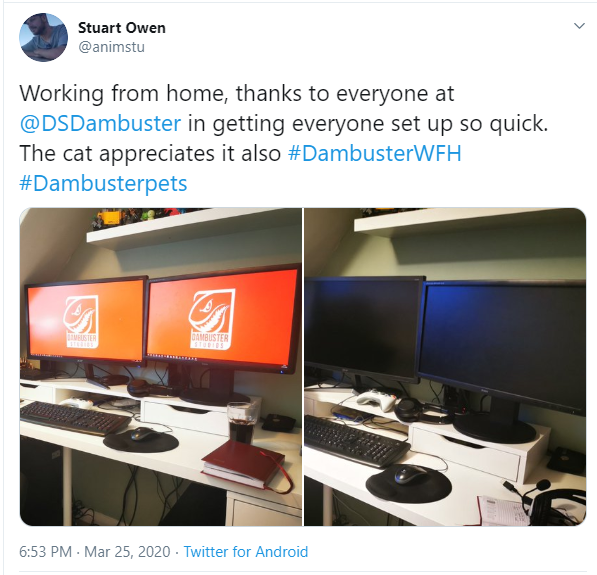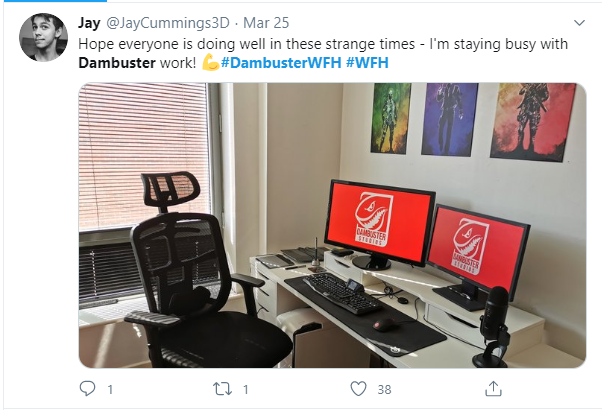Covid-19 has significantly impacted close to every country in the world. In the UK, the necessary measures to prevent the spread of the virus have seen some businesses forced to close entirely for an undetermined period.
For those that have remained open such as ourselves, quickly adopting remote working has been the only way to continue, which has in turn presented its own challenges.
We sat down with our HR Manager Helen Haynes who has been instrumental in achieving this transition towards working from home to hear how Deep Silver Dambuster Studios has adapted during this process and what business as usual means for the studio.
1. What have been the biggest challenges for the studio regarding remote working?
There have been two big challenges that we have faced as a studio. The first is the physical side of working at home. Our studio members use a lot of different technology so ensuring that they can continue to access these remotely is a challenge in itself. Technology aside, we also have to bear in mind that not everyone has a fully-fledged home office set-up and so might have to resort to working on non-purpose kitchen tables, dining chairs etc. We’ve tried to be as accommodating as possible, letting our staff take home everything they need be it their computers, stationary, office equipment or even just a comfy chair!
The second challenge is the psychological side of things. It can be the first time some of our staff have ever worked outside of a studio setting, so they may struggle keeping themselves focused. There is also an often isolating nature to remote working; I know myself that I like to be in the office chatting to people and solving problems as I go. Therefore, we need to try and ensure that people still feel connected and looked after and so we appointed a ‘social secretary’ who checks in with everyone regularly just for a chat and to see how they are. I have also kept in contact with anyone who has themselves or their family members had either had symptoms of the virus or are deemed to be a high risk individual.
2. Who in the studio has made the transition to remote working possible?
The first thing to say is that every single member of the studio played a part in making this possible. It was new territory for us all and if everybody didn’t co-operate, things would have been a lot more difficult! That being said, Andrew Ward and his fantastic IT team were instrumental in making sure everyone had the hardware and software they needed to work from home. The producers and project managers did an excellent job of co-ordinating the delivery of these items, especially Producer Anna Marsh who made sure our Design Team were up and running (even making many of the equipment deliveries herself).
Myself and the Studio Development Director Rob Matthews took care of the personnel side of things, which included putting together a list of studio members who were at high risk or had high risk relatives or factors such as pregnant partners, so that we could prioritize getting them working from home first.

3. Has the recruitment and onboarding process continued or has there been a ‘freeze’ on talent acquisition?
No, we made a conscious decision to make sure it didn’t freeze. If anything, we stepped up our efforts to help people whose employment status might have been adversely affected. Recruitment is key to making sure we tick over, after all talent is the lifeblood of the studio.
We did however, adapt our recruitment process. We’ve expanded advertising into new areas and changed our interview process to be completely virtual through various applications.
Something that we were struggling with however, was candidates not being able to visit Nottingham to make sure the city was a match. To help with this, we have put together a blog about the city that covers topics like costs, things to do, where’s best to eat and that sort of thing. (Read it here)
We now also conduct our inductions virtually. This includes the same IT and HR induction new starters receive in the office and we are in the process of creating a standardised remote first day. Since entering lockdown, we have made 7 job offers, on boarded 4 new starters and have 4 team members starting in the next few weeks, which is something we are really proud of.
4. How do you maintain culture and look after team members when you cannot be in the same room as one another?
As I mentioned before, our Studio Administrator Tracy has taken on the role of Social Secretary, she regularly touches base with everyone to make sure they are okay and is there for anyone if they need someone to chat to. This role was so akin to her personality as she naturally loves chatting to and looking after everyone in the studio.
We have our Instant Messaging service for quick chats and checking in on one another and we’ve encouraged people to do so during this period. There’s also a virtual pub on our Teams set up called ‘The Jolly Dambuster’ where studio staff meet on a Friday afternoon to catch up over a drink!
In my team, we have a Friday lunch virtual catch up, which involves their little ones saying hello over the webcam, during which I’ve been known to blow a soap bubble or two!

5. Is there any advice that you can offer to businesses that may still be struggling to adapt to remote working?
Organisation. You cannot let people just pour out of the studio and go home without a thought about how to maintain culture, relationship and productivity working from home.
You must enable, enable, enable – give people everything they need to do their job to the best of their ability. Like I said before, this might be a new piece of software or just a comfy chair. I personally needed an improvement to my home Wi-Fi signal, which the IT team quickly found a solution for.
And lastly, communicate about everything – social communication is just as important as work-related topics and should never be overlooked.
6. Has this period had any positive effect to the way we approach work, recruitment or any other aspect of studio life?
It has definitely brought us closer as we’ve all needed to pull together during the transition and everyone has been very understanding of the restraints on the studio. We’ve also seen that productivity and deadlines have not been impacted by working from home arrangements, which has highlighted potential opportunities for remote working for the studio in the future.
If you are interested in joining the Deep Silver Dambuster team, head to our careers section to see all of our available opprtunities.




